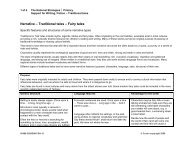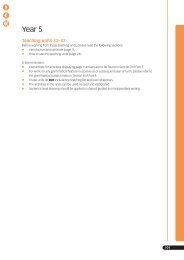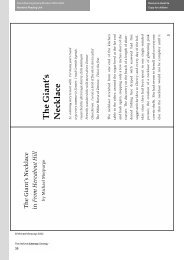Create successful ePaper yourself
Turn your PDF publications into a flip-book with our unique Google optimized e-Paper software.
Stating your<br />
case …<br />
<strong>Writing</strong> <strong>Flier</strong> 9<br />
Persuasion<br />
In everyday life we are all bombarded with persuasive texts:<br />
advertisements, magazine articles, brochures, leaflets, fliers. <strong>Writing</strong><br />
such texts for themselves helps pupils develop awareness of the<br />
techniques others use to influence their thinking.<br />
However, in order to back up their opinions with convincing evidence,<br />
pupils need to be knowledgeable about the subject matter.<br />
The National Curriculum provides many opportunities for pupils to<br />
develop a depth of knowledge on particular topics, which can then be<br />
brought to the Literacy Hour to inform persuasive writing:<br />
� geography, e.g. pupils can express their own viewpoints on topics<br />
‘In the News’ or local issues, such as ‘Should the High Street be<br />
closed to traffic?’<br />
� history, e.g. a local history study or visit to a museum can provide<br />
background information for a publicity campaign and brochure<br />
� science, e.g. knowledge about teeth and nutrition can be used in<br />
compiling leaflets, posters or articles promoting a healthy lifestyle<br />
� PSHE and citizenship, e.g. pupils could devise campaigns about<br />
bullying, road safety, stranger danger.<br />
To put forward their case in writing, pupils must select and organise<br />
information, usually as a series of major points, each of which may<br />
require elaboration (explanation, evidence and/or examples). Notes<br />
on a ‘skeleton’ framework can help with this organisation.<br />
✱<br />
✱<br />
✱<br />
National<br />
Literacy<br />
Strategy<br />
Surveys and fieldwork can lead to an understanding of<br />
issues, as well as providing data which can be used in<br />
writing tasks.<br />
Pupils also need to understand how writers use persuasive devices, such as vocabulary choice, rhetorical questions and<br />
the selective use of evidence, in order to influence the reader. <strong>Writing</strong> persuasive texts will also support children in<br />
comparing views when writing a discussion (see <strong>Flier</strong> 10).<br />
department for<br />
education and skills<br />
Find out more about persuasion<br />
�Further case studies (Y1-Y6) can be found on the NLS website:<br />
www.standards.dfes.gov.uk/literacy<br />
See also pages 154-155, Grammar for writing and Developing early<br />
writing.








